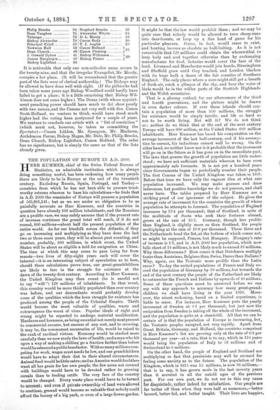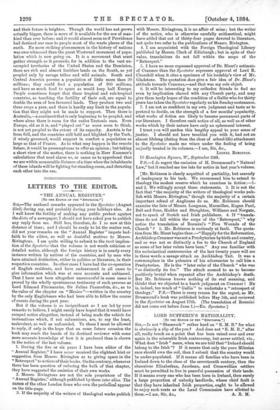THE POPULATION OF EUROPE IN A.D. 2000.
IIERR KUMMER, chief of the Swiss Federal Bureau of Statistics, an admirable institution which is always doing something useful, has been reckoning how many people there are likely to be in Europe at the end of the twentieth century. Excluding Russia, Spain, Portugal, and Turkey— countries from which he has not been able to procure trust- worthy returns whereon to base his calculations—he finds that in A.D. 2000 the remainder of Europe will possess a population of 565,801,141; but as we are under no obligation to be as painfully accurate as Herr Kummer, and the countries in question have already 106 million inhabitants, and the Russians are a prolific race, we may safely assume that if the present rate of increase continues the grand total will reach, if it do not exceed, 800 millions—about half the present population of the entire world. As for our kinsfolk across the Atlantic, if they go on increasing and multiplying as they have done the last two or three score years, they will be almost past counting, and number, probably, 600 millions, in which event, the United States will be about as eligible a field for emigration as China. The time at which this may come to pass being far from remote—two lives of fifty-eight years each will cover the interval—it is an interesting subject of speculation as to how, should these calculations prove true, our great-grandchildren are likely to fare in. the struggle for existence at the dawn of the twenty-first century. According to Herr Kummer, the United Kingdom may then count (he is careful not to say " will ") 129 millions of inhabitants. In that 'event, this country would be more thickly populated than ever country was before, and our descendants would probably develop some of the qualities which the keen struggle for existence has produced among the people of the Celestial Empire. Thrift would become the most valuable of qualities, waste and extravagance the worst of vices. Popular ideals of right and wrong might be expected to undergo material modification. Hardness and keenness, as being essential not merely as at present to commercial success, but success of any sort, and to securing, it may be, the commonest necessaries of life, would be raised to the rank of cardinal virtues. Economy would be studied more carefully than we now study the laws of health ; and amen who hit upon a way of making a shilling go a fraction farther than before would be esteemed a public benefactor. With so many millions com- peting for work, wages must needs be low, and our grandchildren would have to adapt their diet to their altered circumstances. Animal food would belittle eaten; and as America would doubtless want all her grain for her own people, the few acres not covered with buildings would have to be devoted rather to growing cereals than to feeding cattle. The very face of the country would be changed. Every waste place would have to be turned to account; and even if private ownership of land were allowed to continue, ground would become so valuable that nobody could afford the luxury of a big park, or even of a large flower-garden.
It might be that the law would prohibit them ; and we may be quite sure that nobody would be allowed to turn sheep-runs into deer-forests, or keep up a fine head of game for his particular pleasure. Game, in fact, would cease to exist, and hunting become as obsolete as bull-baiting. As it is not conceivable that 129 millions could obtain the wherewithal to keep body and soul together otherwise than by exchanging manufactures for food, factories would cover the face of the land. Liverpool and Manchester would join hands, Birmingham and Sheffield grow until they touched, and London blacken with its huge bulk a dozen of the fair counties of Southern England. The only places where a man might still get a breath of fresh air, catch a glimpse of the sky, and hear the voice of birds would be in the wilder parts of the Scottish Highlands and the Welsh mountains.
That is a gloomy outlook for our aftercomers of the third and fourth generations, and the picture might be drawn in even darker colours. If ever these islands should con- tain a population of more than 100 millions, the struggle for existence would be simply terrific, and life so hard as not to be worth living. But will it P We do not think so ; neither do we think that at the end of the next century Europe will have 800 million, or the United States 600 million inhabitants. Herr Kummer has based his computation on the average increment of the last half-century, and if his assump- tion be correct, his inductions cannot well be wrong. On the other hand, we neither know nor is it probable that the increment will go on in the future as it has gone on in the immediate past. The laws that govern the growth of population are little under- stood ; we have not sufficient materials whereon to base even approximately safe forecasts. It is not yet a hundred years since Governments began to periodically number their people. The first Census of the United Kingdom was taken in 1801. Before that time we have only the vaguest idea at what rate population increased. We may make guesses and draw inferences, but positive knowledge we do not possess, and shall never have. The tables prepared by Herr Kummer are a striking proof of our ignorance of the subject. He gives the average rate of increment for the countries the growth of whose population he attempts to forecast. The population of England increases by 134 per thousand; that of Scotland, in spite of the multitude of Scots who seek their fortunes abroad, grows at the rate of 10 7. Germany, though less prolific than England, is slightly more so than Scotland, the people multiplying at the rate of 10-8 per thousand. These three and the Netherlands head the list, at the bottom of which comes not, as might be supposed, France, but Hungary. Hungary's rate of increase is 1-1, and in A.D. 2000 her population, which now falls short of 14 millions, is not likely much to exceed 16 millions. Why these differences? How comes it that Dutchmen multiply faster than Austrians, Belgians than Swiss, Danes than Italians? Why, again, are the Teutonic more prolific than the Latin races ? To-day the united populations of France and Italy ex- ceed the population of Germany by 30 millions, but towards the end of the next century the people of the Fatherland are likely to outnumber the French and Italians by upwards of 40 millions. Some of these questions must be answered before we can say with any approach to accuracy how many great-grand- children we shall have living in the year 1999. More- over, the nicest reckoning, based on a limited experience, is liable to error. For instance, Herr Kummer puts the yearly increment of Sweden at 9-1 per thousand; but just now the emigration from Sweden is taking off the whole of the increment, and the population is quite at a standstill. All that we can be certain of is that the population of Europe is increasing, but, the Teutonic peoples excepted, not very rapidly. Apart from Great Britain, Germany, and Holland, the countries comprised in Herr Kummer's list are growing only at the rate of 6-4 per thousand per year—at a rate, that is to say, which in 116 years would bring the population of Italy to 58 millions and of Switzerland to 6 millions.
On the other hand, the people of England and Scotland are multiplying so fast that pessimists may well be excused for feeling some anxiety as to the future. The population of the Kingdom, which in 1815 was 15 millions, is now 36 millions,— that is to say, it has grown moil) in the last seventy years than it accreted in all the untold ages of the previous pad. For our own part, we do not see in this any cause for disquietude, rather indeed for satisfaction. Oar people are far better off than when they were half as numerous,—better housed, better fed, and better taught. Their lives are happier,
and their future is brighter. Though the world has not grown actually bigger, there is more of it available for the use of man- kind than ever before; and it would almost seem as if Providence had destined our race to people most of the waste places of the earth. No more striking phenomenon in the history of nations was ever witnessed than the great Westward movement of popu- lation which is now going on. It is a movement that must gather strength as it proceeds, for in addition to the vast un- occupied territories of the United States and the Dominion, there are rich and almost limitless lands on the South, as yet peopled only by savage tribes and wild animals. South and Central America possess a population of little more than 30 millions ; they could feed a population of 300 millions, and have as much food to spare as would keep half Europe. People sometimes forget that these tropical and sub-tropical countries, as touching the fertility of their soil, are equal to double the area of less favoured lands. They produce two and three crops a year, and there is hardly any limit to the popula- tion that they might not be made to support. Then there is Australia,—a continent that is only beginning to be peopled, and where alone there is room for the entire Teutonic race. Even Europe, old as it is, and "played out" as some seem to think, is not yet peopled to the extent of its capacity. Austria is far from full, and the countries still held and blighted by the Turk, if wisely governed, would support in comfort a population as large as that of France. As to what may happen in the remote future, it would be presumptuous to offer an opinion ; but taking a short view of the matter, there is nothing in Herr Kummer's calculations that need alarm us, or cause us to apprehend that we are within measurable distance of a time when the inhabitants of these islands will be fighting for standing-room, and thrusting each other into the sea.















































 Previous page
Previous page